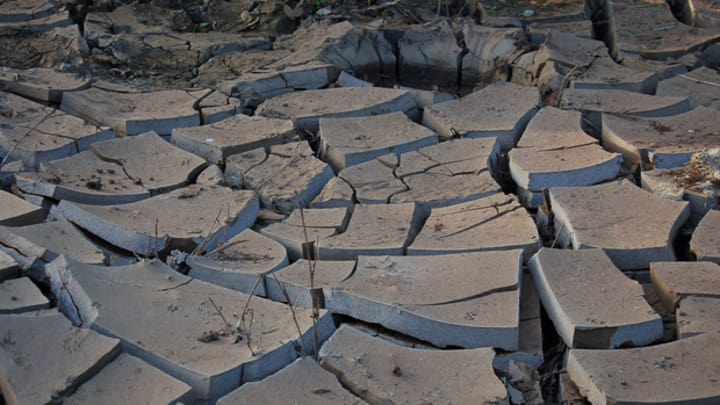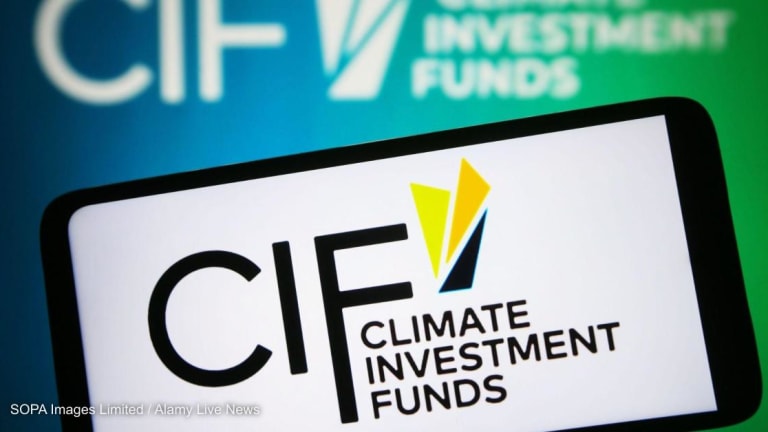
In line with its 2013-2022 strategy, the African Development Bank has launched a new climate fund aimed at helping its continent of focus transition to green growth.
The initiative is starting small — currently with only €4.7 million ($6.5 million) in seed funding from Germany — but the bank aims to get many more donors to commit in the coming months.
An ambitious goal? Yes. But an impossible one? No.
Florence Richard, task manager of AfDB’s new Africa Climate Change Fund, told Devex in an exclusive interview that the bank plans to show other potential donors that “we can already have results in the first year” in order to get them interested in the ACCF.
We discussed with Richard how this new fund, approved last week by the bank’s board in Tunis, is different from others already in place, such as the Green Climate Fund and the Climate Investment Fund — for which the AfDB is an executing agency — and how the initiative can create synergies rather than duplicate efforts and therefore be seen by rival funds as competition for donor money.
Below are more highlights from our conversation:
There are so many climate funds already functioning now, like the CIF. How is the ACCF any different?
For countries to benefit from CIF financing, you have to become a pilot country. In Africa, we have a few pilot countries for various programs of CIF ... but unless you are already part of the programs or become part of the programs, you cannot access the CIF funds.
We manage some other climate-related funds in the bank, but they focus on targeted issues like adaptation, climate data information, renewable energy, etc. We created the ACCF because we found that, on the one hand, the funds we manage in the bank are too narrow in scope, looking at specific issues, and on the other hand, the global funds like CIF have a limited number of countries that can benefit from their financing, so there was always a limitation somewhere.
With the ACCF, we are starting small ... but the objective is to scale up and attract funds from other donors as soon as possible, [and] to have a fund that would be broad enough that it could cover all issues related to climate change. All climate-related issues could be covered by the fund, and all countries in Africa could benefit from it. The idea is to use this fund as a complement to the funds we already manage, and create synergies between the funds to get the best out of the financing available to African countries.
In terms of how the ACCF will relate with the GCF, we expect the ACCF to work in close relation with the GCF; for instance, the first call for proposals under the ACCF will focus on climate finance readiness with a view to support African countries in getting ready to attract financing from the GCF. The objective is to really work in synergies.
Read: GEF tired of 'business-as-usual' approach to environment
If and when ACCF becomes a multidonor trust fund, will it not be seen as competition for donor funding, for instance with the GCF?
We're talking about a different scale here. The GCF will become a key financing instrument for financing climate-smart development at the international level and hence intends to channel hundreds of millions of dollars, even billions of dollars in the coming decades. With ACCF, we're talking about a smaller animal. Even if it becomes a multidonor trust fund, it will not be that big as the GCF since it has a different objective and scope. So we're talking about different instruments in terms of scope and scale. There's no competition between the ACCF and the GCF. It's a different animal.
Germany has already injected funding into this fund for an initial period of three years. Which other donors are you eyeing to make contributions? Are there donors already showing signs of interest?
At this stage we cannot really mention any countries … but we have had interesting discussions with a few donor countries, and we hope that, maybe not this year, but next, we would get new donors to join. Our objective is to scale up, but what we want to do is to use the seed financing ... to show that we can already have results in the first year; with these results, we’ll attract other donors, when everybody knows that we can deliver.
You’re open to governments, NGOs, research and regional institutions. How can they apply, what are the requirements, and what kind of project proposals are likely to be financed?
We are right now structuring the fund. We intend to launch a call for proposals in order to get proposals from targeted beneficiaries. The type of activities that could be financed under this call for proposals could either focus on helping African countries design low carbon or climate resilient investment plans, or helping them design a pipeline of bankable projects that could potentially be submitted to the GCF for financing later on. Or it could be some capacity building in relation to climate finance … If beneficiaries want to have direct access to the GCF, they need to have good standards and capacity in terms of environmental and social safeguards for instance, and the ACCF could help them with this.
Will the fund have special arrangements with donors, and will they have a say in the kind of projects you'll finance?
A governance structure will be put in place for the fund management, including an internal bank technical committee that will look at the proposals we’ll receive. Donors [in this case Germany] would have a say when the amount of the proposals go beyond a certain threshold (above $500,000). Once we have selected the best proposals according to the fund’s objectives and criteria, we will prepare a work program that will be shared with the donor for information. Hence, the donor will be informed of what the fund will finance … I think it's more about sharing information and coordination, rather than anything else.
Grants can be executed by the recipients or by the bank on their behalf. Is the latter new? How will that work?
It's not new. Other institutions do the same. At the AfDB, grants from trust funds are usually implemented by recipients, but in this case, we thought it might be good to have an option whereby some beneficiaries can request the bank to execute the activities on their behalf when they feel like it can be more efficient. What we are looking for is more efficiency. In some cases, it might happen that the beneficiaries do not have the capacity to execute the grants from the point of view of procurement and financial management — in accordance with bank’s rules and procedures — for instance; in such cases we thought it would actually be more efficient if we agreed with the beneficiaries on what they want to do, and the bank can then procure the services needed and manage the grant funding to achieve the objectives, while the technical activities would still be handled by the beneficiary. Our preferred option is that everything is managed by the beneficiaries — but if we feel like there would be some delay and make it less efficient for the country, then we can have the option of having the grant administered directly by the bank.
You’ve started with a call for proposals, but when can we expect the fund to be really operational?
The process might take a few months. So I'm not sure how long will it take, but I would hope that we would start operational work in September at the latest.
Read more development aid news online, and subscribe to The Development Newswire to receive top international development headlines from the world’s leading donors, news sources and opinion leaders — emailed to you FREE every business day.




